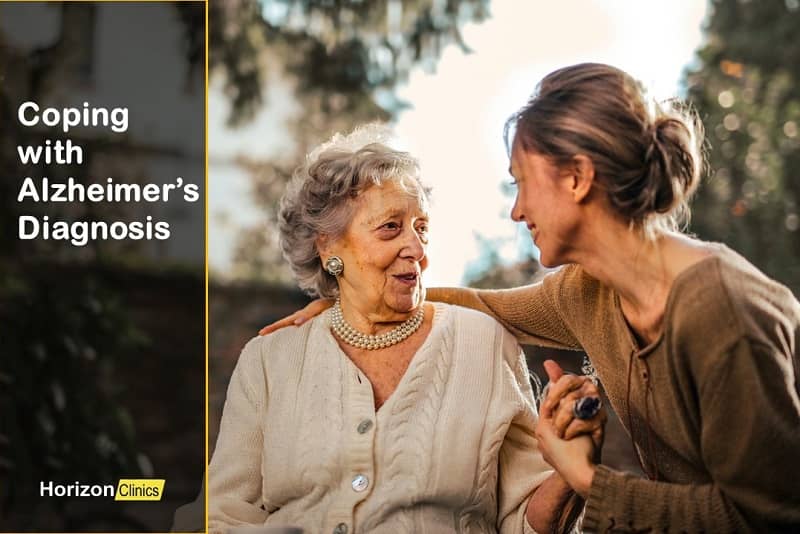How do you cope with Alzheimer’s Diagnosis?
Some preventative measures can help you navigate your way through the progressing symptoms.
Well, Alzheimer’s is a condition that has a lot to do with the degeneration of brain cells.
This is when brain cells start to die, destroying memory.
In fact, Alzheimer’s is the final stage of someone with dementia. That’s why it’s so crucial to take early steps to Prevent Alzheimer’s symptoms from worsening.
The most common symptoms people experience involve mental confusion and memory loss.
Also, look out for these common Alzheimer’s Symptoms:
- Recurring forgetfulness
- Confusion, especially at nights
- Outbursts and confusion
- Poor navigation skills
- Poor coordination
- Difficulty in communication
Moreover, Alzheimer’s is typically a disease associated with older adults. However, there can be two different types.
Types of Alzheimer’s Disease
The loss of amyloid-beta protein causes Alzheimer’s. The two types of Alzheimer’s with common symptoms can be:
#1. Early-onset Alzheimer’s
It occurs in people below 65yrs. They are often diagnosed in the 40s. People with down syndrome are likely to have it.
#2. Late-onset Alzheimer’s
It’s the most common type of Alzheimer’s. It usually occurs in the mid-60s. Moreover, the real reason is generally associated with family genes and poor lifestyle.
Though, the Role of Genetics in Alzheimer’s Disease is still the most studied subject in medicine.
Now, here are some steps to address the risk of developing Alzheimer’s.
How to Cope with Alzheimer’s Diagnosis: First Steps
A person with a family history of Alzheimer’s should be in touch with the doctor.
Furthermore, studies have proven that high cholesterol and high blood pressure puts a person at a greater risk of Alzheimer’s.
Prevention is the cure in such cases. These steps offer a roadmap on how to cope with Alzheimer’s diagnosis.
Not only that, but most of these are also useful to delay the onset of the disease in the first place.
#1. Taking Care of Nutrition
If Alzheimer’s disease runs in the family, nutrition is the basic step for improvement. Control the memory loss disease with a balanced diet:
- Elimination of processed food.
- Healthy home-cooked foods are always recommended.
- Seek nutrition therapy.
#2. Exercising
The most important memory retention activity is through exercising. If you start early in your youth, the problem can be less burdensome.
Aerobic exercise and simple dumbbell picking are effective.
#3. Being a Social Butterfly
Yes, even if this sounds tedious… try it. For better cognitive skills and the ability to recollect, being interactive helps a lot.
Meeting new people and trying to befriend them helps. Enrolling in some group activity helps as well. The undertone is to be busy and interactive.
#4. Sleeping Well
A busy life makes it hard to have enough sleep. It is a massive issue, though! Early to bed, early to rise definitely helps fight Alzheimer’s.
So, a routine with quality sleep should be present.
#5. Early Consultation
The most important step is to start early and practice the advice early. In the later stages of life, all it causes is more confusion.
Natural Remedies to Prevent Alzheimer’s
There are several natural remedies incorporated in lifestyle and food habits. They are not proven, but they are highly recommended.
#1. Foods Loaded with Vitamins B, D, and E.
The best way to get Vitamin D is to soak in the Sun. Vitamin B and E capsules are present in the market. Yet, it’s recommended to eat fresh fruits and vegetables.
These vitamin groups are necessary for the nervous system and brain. Try including them in the diet.
#2. Coconut Oil
Coconut is brain food. Thus, it’s often present in the diet of Alzheimer’s patients. It benefits them a lot.
Coconut ketone therapy helps to reverse Alzheimer’s, and, in the best-case scenario, even eliminate it.
#3. Cinnamon Extract
This is another super brain food. It boosts cognitive skills. Coconut helps in retention power. Plus, it’s easy to add as an ingredient in several recipes.
#4. Almonds
In Asian countries, almonds are soaked overnight and are consumed by kids and adults. It is a memory booster food. It has several benefits. Thus, add it as a snack or during breakfast as well.
Now, the patient is not the only one coping with the disease. But the caregivers also matter equally when deciding how to cope with Alzheimer’s diagnosis.
So, here are some tips for those looking after the patient.
Tips for Caring for Someone with Alzheimer’s
Having someone with Alzheimer’s is a very tiring and heart-breaking feeling. Imagine a dear one not recognizing you!
However, also imagine the anxiousness the patient suffers. They fail to recollect memories, making their lives miserable.
It is very difficult indeed, but the natural remedies are only basic methods. Regular medication and brain scanning should be done. That too under the guidance of a neurologist.
Below mentioned are some tips for someone caring for a patient with Alzheimer’s:
- Try not to get irritated or shout at the patient
- Install location trackers in their day clothes
- Keep the neighborhood informed about the condition
- Medical facilities are a good option
- Handle them with love and care
- Label their belongings
- Try to spend time with them
Alzheimer’s disease is tiring, but natural treatments along with medications may help a lot.
Yet, taking care of someone with Alzheimer’s also means you should take care of your mental health as well.
Try to keep a check on how you’re feeling around a particular situation. This should help you manage the debilitating symptoms of someone else while taking care of your mental health.
Hopefully, you’ve found these preventative measures for Alzheimer’s disease insightful.
To explore more such content on mental health and research, feel free to stop by our official website Horizon Clinics.
